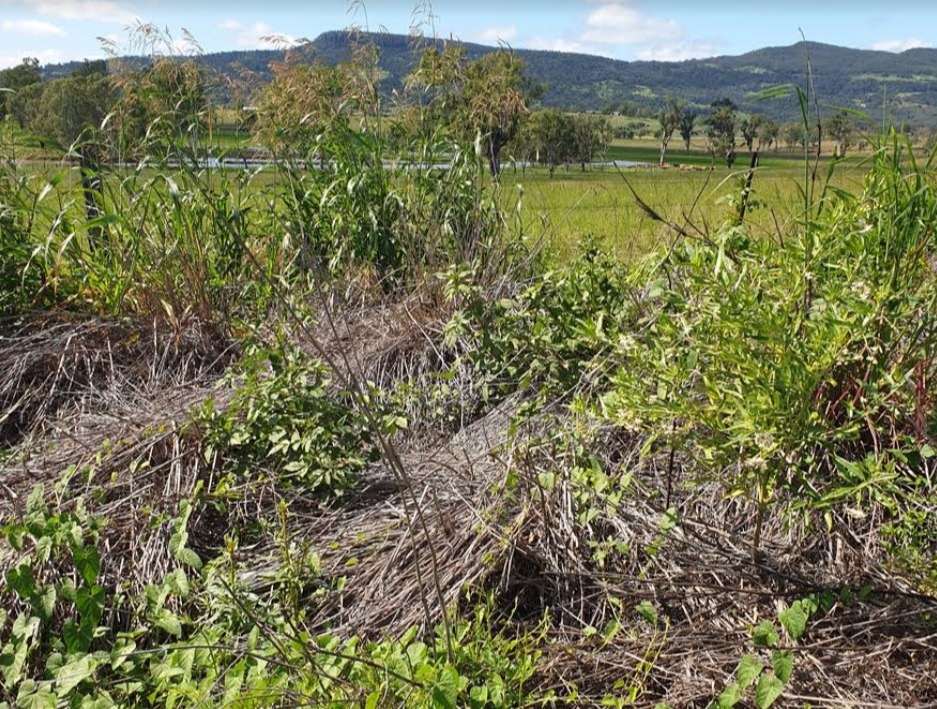
Pasture dieback in Queensland, summer growing native and sown grasses turn yellow and red, become unthrifty and eventually die. Image – NSW DPI.
NEW South Wale’s first case of pasture dieback has been identified on the state’s north coast, prompting a warning from the state’s Department of Primary Industries.
NSW’s Department of Primary Industries has not yet stated what plant the dieback was identified in, but the disease is known to kill sown and native summer growing grasses in Queensland.
Producers should contact NSW Department of Primary Industries (DPI) or the Exotic Plant Pest hotline – 1800 084 881 – if they suspect their pasture has the condition.
NSW DPI pasture systems development officer, Sarah Baker, said it’s important to identify where pasture dieback is occurring to determine its spread and impact.
“We aim to provide producers with the information they need to understand, recognise and manage the condition.
“Pasture dieback causes summer growing grasses to turn yellow and red, become unthrifty and eventually die,” Ms Baker said.
“Cases of suspected pasture dieback were reported during the 2018-19 summer, but with drought masking the condition, confirmation was impossible at the time.
“Recent rainfall has assisted us in identifying dieback, which previously had been found only in Queensland,” she said.
It has been estimated the affected area in Queensland is at least 200,000 hectares and could cover up to 4.4 million hectares, with the cause still to be confirmed.
MS Baker said NSW DPI did not want farmers think pasture dieback only affected one particular species.
“We want them to be looking at all their pastures, especially the summer growing grasses.
“From what we know from Queensland, this is the list of species (below) that can be affected,” she said.
“The ones of particular concern on the NSW north coast include Kikuyu, Rhodes grass and Seteria.
Ms Baker said sown grass species known to be affected by dieback include:
Buffel grass (Cenchrus ciliaris)
Rhodes grass (Chloris gayana)
Green and Gatton panic (Megathyrsus maximus)
Bambatsi panic (Panicum coloratum)
Kikuyu (Pennisetum clandestinum)
Paspalum (Paspalum dilatatum and P. plicatulum)
Creeping bluegrass (Bothriochloa insculpta)
Digit grass (Digitaria eriantha)
Sabi grass (Urochloa mosambicensis)
Signal grass (Brachiaria decumbens syn. Urochloa decumbens)
Para grass (Brachiaria mutica syn. Urochloa mutica)
Setaria (Setaria sphacelata)
Purple pigeon grass (Setaria incrassata)
Forest bluegrass (Bothriochloa bladhii ssp. glabra)
Indian couch (Bothriochloa pertusa)
Other grass species known to be affected include:
Black spear-grass (Heteropogon contortus)
Forest bluegrass (Bothriochloa bladhii)
Golden beard grass (Chrysopogon fallax)
Giant rat’s tail grass (Sporobolus pyramidalis)
There are potentially more grass species that could be affected, Ms Baker said.
NSW DPI said while control options remain dependant on identification of the cause, producers can continue to maintain production with broadleaf species, including legumes and brassicas, which are not affected by dieback.
Re-sowing perennial grasses into dieback affected areas is not recommended. However, annual winter growing forages, including oats and dual-purpose cereals can help fill winter feed requirements.
NSW DPI is working with the Queensland Department of Agriculture and Fisheries, University of Queensland, Queensland University of Technology and industry, through Meat & Livestock Australia, to explore the cause of the condition.
As researchers work to better understand pasture dieback, including investigations of insect involvement, NSW DPI is developing options for future management.
For more information is NSW DPI on pasture dieback click here.

HAVE YOUR SAY